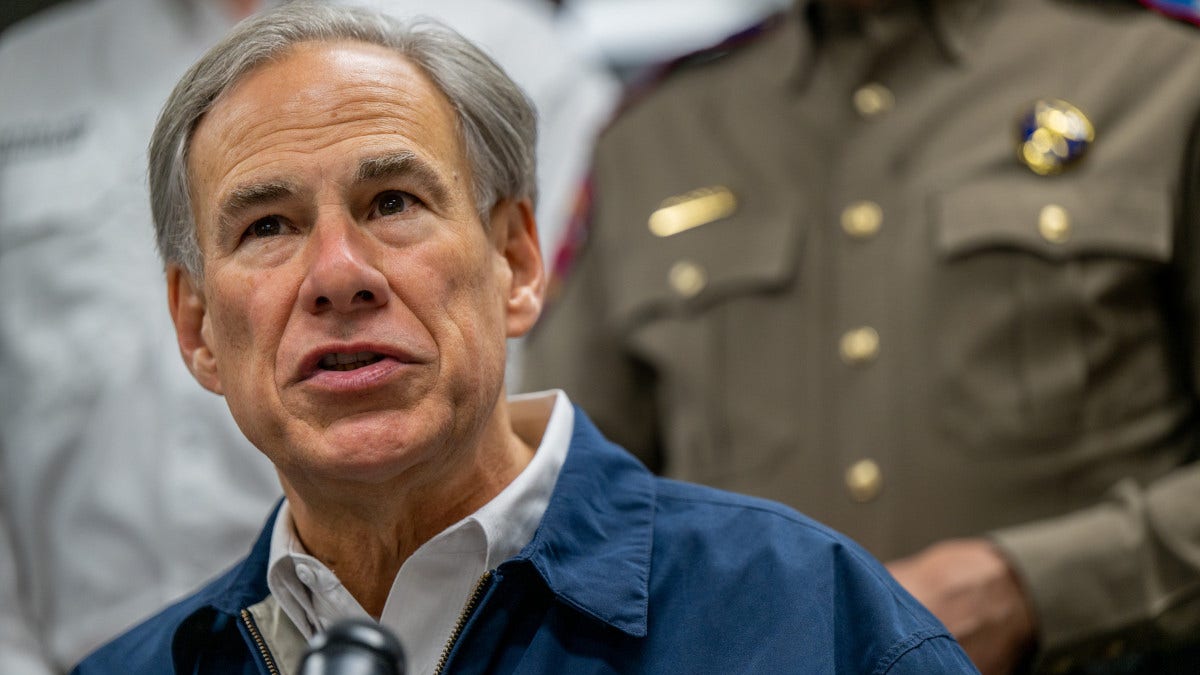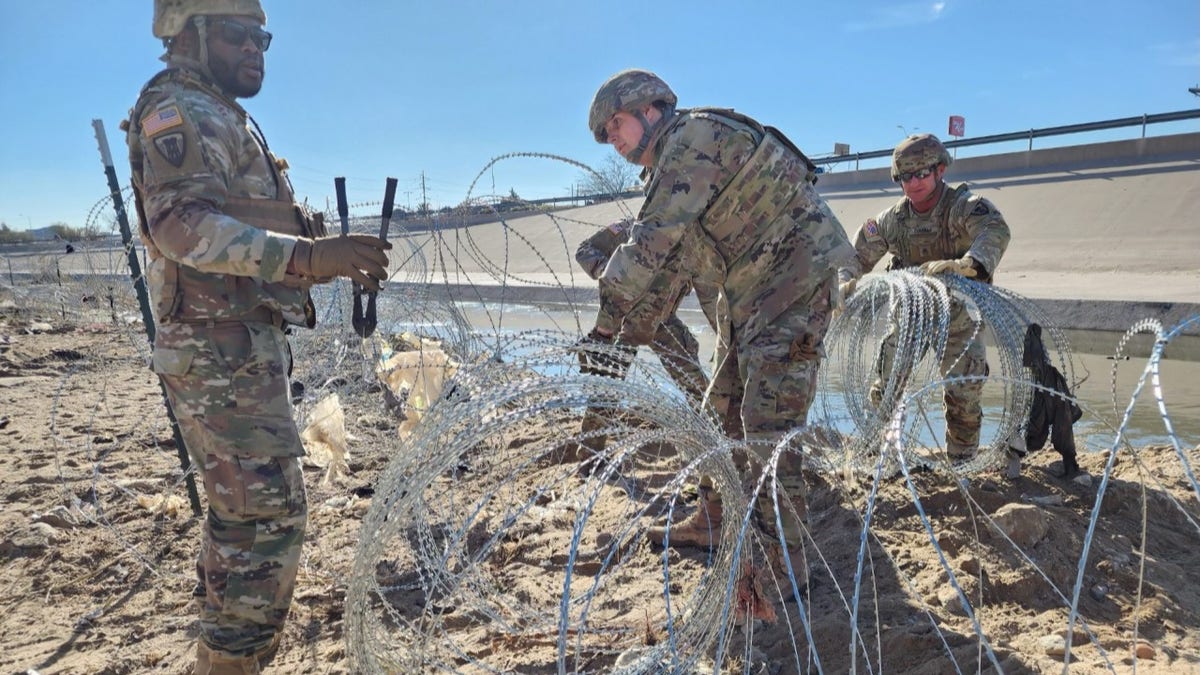Texas county joins others declaring border invasion in response to Supreme Court ruling
Montgomery County, Texas, resident Jonathan Hullihan discusses counties in the Lone Star State that have declared a border invasion.
The latest Supreme Court decision in Texas’ battle with the Biden White House has sparked a showdown over the Lone Star State’s constitutional authority to defend itself with the federal government seemingly getting in its way.
On Monday, in a 5-4 decision on an emergency appeal, the Supreme Court ruled to temporarily overturn a lower court’s injunction that banned the federal government from cutting razor fencing Texas had installed along the border near Eagle Pass while litigation continues.
Late Wednesday night, Texas Gov. Greg Abbott declared his constitutional authority to reserve the right of his state to self-defense against an invasion, adding that the executive branch had broken its constitutional pact with the states by failing to enforce federal immigration laws.
Legal experts told Fox News Digital Texas is well within its constitutional rights and within the Supreme Court’s order to keep building the razor-wire fence even if the feds continue to cut it before an appeals court addresses the matter.

Texas Gov. Greg Abbott (Brandon Bell/Getty Images)
Gene Hamilton, vice president and general counsel at America First Legal and a former Justice Department official in the Trump administration, said Abbott's continuation of installing the razor wire is "exactly the right move."
"Unless and until a federal judge comes in and says, ‘You may not, State of Texas, put razor wire up along the border anymore,' Texas should keep doing exactly what it needs to do. And, eventually, this turns into a game of will between the feds and the State of Texas," Hamilton said.
ABBOTT DECLARES TEXAS HAS 'RIGHT TO SELF-DEFENSE' FROM MIGRANT 'INVASION' AMID FEUD WITH BIDEN ADMIN
Hamilton noted that he believed the Supreme Court’s controversial order was wrong and gave too much weight to the government's assertions about the wire's effect on the federal government's ability to enforce immigration laws.
He asserted that Texas was not interfering with the government's enforcement of the laws by creating additional barriers along the border and contended that those barriers actually facilitate the federal government's ability to deter and prohibit illegal crossings at the locations where they were present.

Texas National Guard soldiers install razor wire along the border in an effort to stop immigrants from illegally crossing into the country from Mexico. (Texas Governor Greg Abbott)
"The Supreme Court’s two-sentence order simply vacated the injunction preventing the federal government from tearing down the barbed wire fencing Texas has placed on state property while the case is on appeal," Hans von Spakovsky, senior legal fellow at the Edwin Meese III Center for Legal and Judicial Studies told Fox News Digital.
"The Supreme Court’s order does not prevent Texas from continuing to place barbed wire or other barriers along the border on state or private property. But while the case is pending, there is nothing preventing the federal government from tearing down the wire fencing," he said.
As to Abbott's Article 1 assertions, von Spakovsky said that "whether or not what is happening is an ‘invasion’ within the meaning of the Constitution is a controversial and legally undetermined issue."
Article 1, Section 10, which Abbott says was "triggered" by Biden's inaction at the border, states, "No State shall, without the Consent of Congress, lay any Duty of Tonnage, keep Troops, or Ships of War in time of Peace, enter into any Agreement or Compact with another State, or with a foreign Power, or engage in War, unless actually invaded, or in such imminent Danger as will not admit of delay."
GOP GOVERNORS RALLY BEHIND TEXAS AS ABBOTT DEFIES BIDEN: ‘DERELICTION OF DUTY’
"It is truly shocking and outrageous that the Biden administration has so intentionally and deliberately mishandled the security of our Southern border that states like Texas, for the first time in our history, feel the need to invoke the invasion clause," von Spakovsky said.
Ultimately, he says, the matter will need to be decided by the Supreme Court.
In 2012, the Supreme Court decided a case against Arizona brought by the federal government, which sued after Arizona empowered state officials to enforce immigration laws.
Arizona lost that case, but the late Justice Antonin Scalia dissented, writing that "as a sovereign, Arizona has the inherent power to exclude persons from its territory, subject only to those limitations expressed in the Constitution or constitutionally imposed by Congress. That power to exclude has long been recognized as inherent in sovereignty."

A U.S. Border Patrol agent watches more than 2,000 migrants at a field processing center Dec. 18, 2023, in Eagle Pass, Texas. (John Moore/Getty Images)
William Lane, a partner at Wiley Rein LLP and former DOJ official, suggested to Fox News Digital the Supreme Court may eventually consider the Texas case on the merits or a number of other challenges between states and the executive branch percolating in the courts. If the court does choose to weigh in, it may be asked to reconsider Justice Scalia’s theory.
"A decade ago, the Supreme Court rejected an attempt by Arizona to regulate immigration. Justice Scalia, dissenting, argued that states retain at least some inherent authority under the Constitution to control their borders," said Lane.
"The court has changed significantly since then, and it'll be interesting to see whether there's any appetite to revisit that decision as states like Texas try to address illegal immigration on their own," he said.
"It should be no surprise that Gov. Abbott has chosen to embrace Justice Scalia’s theory of state sovereignty in defending Texas’s actions."
CLICK HERE TO GET THE FOX NEWS APP
Josh Blackman, a professor at South Texas College of Law, emphasized that the high court’s ruling Monday, as an emergency docket decision, was "very narrow."
"I think what we are getting closer to is, unless the Supreme Court says what Texas can and can’t do, Texas will be pushing the boundaries," Blackman said.
The Fifth Circuit Court of Appeals will hear the merits of Texas’ case over the Eagle Pass razor wire on Feb. 7.














































